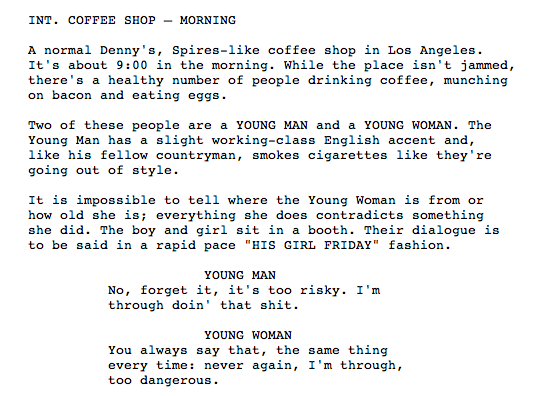
Pulp Fiction Screenplay Review
Like many millennials with an interest in film, Quentin Tarantino was one of the first directors who really reached me, and made me realize the power of the auteur. His film Pulp Fiction was a movie that broke all the rules, no matter what, you couldn’t get a handle on it, anticipate what would happen next, or even prescribe it a fixed genre. It’s dark comedy, it’s gangland camp, it’s a fever dream, it’s a classic watershed movie madly in love with other classic watershed movies.
Not surprisingly, all of the memorable dialogue found in movie is verbatim in the script, but what did surprise me is Tarantino’s pension for using other movies to describe his own scenes. I never would’ve thought to compare Pulp Fiction to His Girl Friday but in the opening he literally says that the dialogue should be said like Cary Grant in that film.
It is impossible to tell where the Young Woman is from or how old she is; everything she does contradicts something she did. The boy and girl sit in a booth. Their dialogue is to be said in a rapid pace “HIS GIRL FRIDAY” fashion.
Other interesting things are the little cosmetic changes throughout the script. Jules and Vincent wearing green trench coats? Jules having a huge afro instead of that Jew curl wig he’s sporting in the film?
An old gas guzzling, dirty, white 1974 Chevy Nova BARRELS down a homeless-ridden street in Hollywood. In the front seat are two young fellas – one white, one black – both wearing cheap black suits with thin black ties under long green dusters. Their names are VINCENT VEGA (white) and JULES WINNFIELD (black). Jules is behind the wheel.
Vincent and Jules, their long matching overcoats practically dragging on the ground, walk through the courtyard of what looks like a hacienda-style Hollywood apartment building.
It was weird to imagine the iconic suits worn by John Travolta and Samuel L Jackson from the film covered by green dusters, of all things. But just about everything else in the script is as it appears in the film. Reading the script really is just like watching the film, and it made me think of a quote from the man himself:
“If it works on the page, it can work on the screen”
—Quentin Tarantino
Tarantino’s whole philosophy has been that it all starts with good writing; the rest builds upon that foundation brick by brick. While minor cosmetic things might go by the wayside, the script is the heart and soul of the movie. I learned a lot from reading his scripts, in fact I always have one on hand for when I write one of my own.
